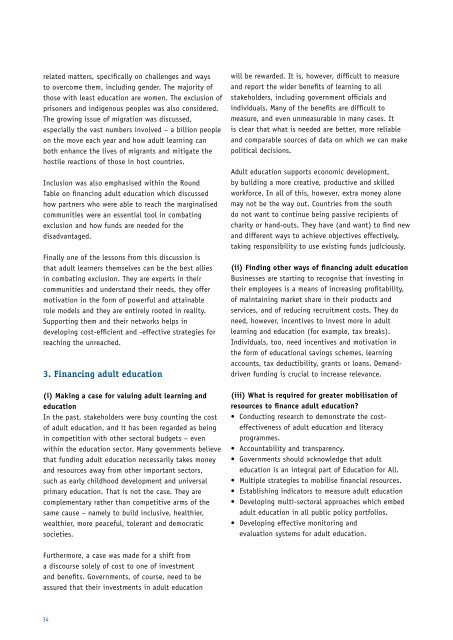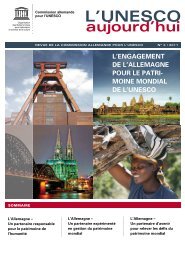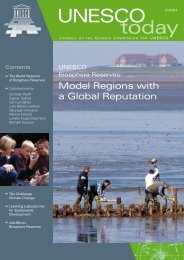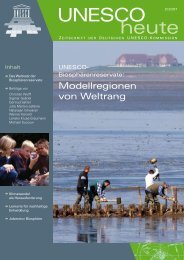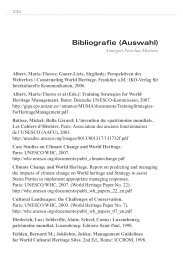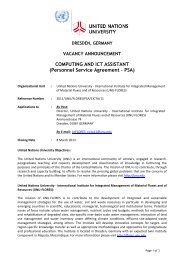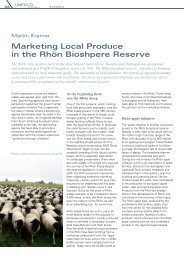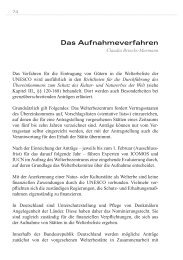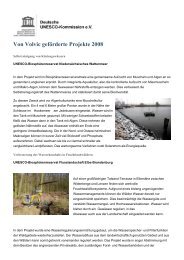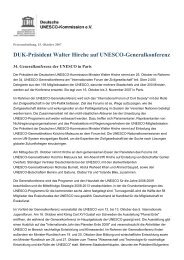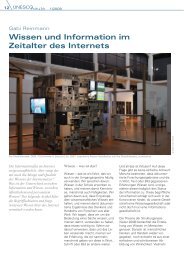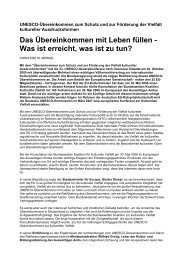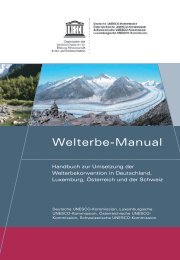CONFINTEA VI, final report - Unesco
CONFINTEA VI, final report - Unesco
CONFINTEA VI, final report - Unesco
You also want an ePaper? Increase the reach of your titles
YUMPU automatically turns print PDFs into web optimized ePapers that Google loves.
elated matters, specifically on challenges and ways<br />
to overcome them, including gender. The majority of<br />
those with least education are women. The exclusion of<br />
prisoners and indigenous peoples was also considered.<br />
The growing issue of migration was discussed,<br />
especially the vast numbers involved – a billion people<br />
on the move each year and how adult learning can<br />
both enhance the lives of migrants and mitigate the<br />
hostile reactions of those in host countries.<br />
Inclusion was also emphasised within the Round<br />
Table on financing adult education which discussed<br />
how partners who were able to reach the marginalised<br />
communities were an essential tool in combating<br />
exclusion and how funds are needed for the<br />
disadvantaged.<br />
Finally one of the lessons from this discussion is<br />
that adult learners themselves can be the best allies<br />
in combating exclusion. They are experts in their<br />
communities and understand their needs, they offer<br />
motivation in the form of powerful and attainable<br />
role models and they are entirely rooted in reality.<br />
Supporting them and their networks helps in<br />
developing cost-efficient and -effective strategies for<br />
reaching the unreached.<br />
3. Financing adult education<br />
(i) Making a case for valuing adult learning and<br />
education<br />
In the past, stakeholders were busy counting the cost<br />
of adult education, and it has been regarded as being<br />
in competition with other sectoral budgets – even<br />
within the education sector. Many governments believe<br />
that funding adult education necessarily takes money<br />
and resources away from other important sectors,<br />
such as early childhood development and universal<br />
primary education. That is not the case. They are<br />
complementary rather than competitive arms of the<br />
same cause – namely to build inclusive, healthier,<br />
wealthier, more peaceful, tolerant and democratic<br />
societies.<br />
Furthermore, a case was made for a shift from<br />
a discourse solely of cost to one of investment<br />
and benefits. Governments, of course, need to be<br />
assured that their investments in adult education<br />
34<br />
will be rewarded. It is, however, difficult to measure<br />
and <strong>report</strong> the wider benefits of learning to all<br />
stakeholders, including government officials and<br />
individuals. Many of the benefits are difficult to<br />
measure, and even unmeasurable in many cases. It<br />
is clear that what is needed are better, more reliable<br />
and comparable sources of data on which we can make<br />
political decisions.<br />
Adult education supports economic development,<br />
by building a more creative, productive and skilled<br />
workforce. In all of this, however, extra money alone<br />
may not be the way out. Countries from the south<br />
do not want to continue being passive recipients of<br />
charity or hand-outs. They have (and want) to find new<br />
and different ways to achieve objectives effectively,<br />
taking responsibility to use existing funds judiciously.<br />
(ii) Finding other ways of financing adult education<br />
Businesses are starting to recognise that investing in<br />
their employees is a means of increasing profitability,<br />
of maintaining market share in their products and<br />
services, and of reducing recruitment costs. They do<br />
need, however, incentives to invest more in adult<br />
learning and education (for example, tax breaks).<br />
Individuals, too, need incentives and motivation in<br />
the form of educational savings schemes, learning<br />
accounts, tax deductibility, grants or loans. Demanddriven<br />
funding is crucial to increase relevance.<br />
(iii) What is required for greater mobilisation of<br />
resources to finance adult education?<br />
• Conducting research to demonstrate the costeffectiveness<br />
of adult education and literacy<br />
programmes.<br />
• Accountability and transparency.<br />
• Governments should acknowledge that adult<br />
education is an integral part of Education for All.<br />
• Multiple strategies to mobilise financial resources.<br />
• Establishing indicators to measure adult education<br />
• Developing multi-sectoral approaches which embed<br />
adult education in all public policy portfolios.<br />
• Developing effective monitoring and<br />
evaluation systems for adult education.


